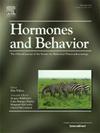Chronic high-dose testosterone disrupts social cognition and enhances social dominance in male long-Evans rats
IF 2.4
3区 医学
Q2 BEHAVIORAL SCIENCES
引用次数: 0
Abstract
While increased aggression is the most consistent behavioral effect of anabolic androgenic steroid (AAS) abuse, its cause remains unclear. AAS may promote aggression by disrupting social behaviors which maintain dominance hierarchies. To model AAS abuse, we treated male rats with chronic high-dose testosterone and tested social recognition, social learning, and competitive and aggressive dominance. Rats received daily injections s.c. of testosterone (7.5 mg/kg) or vehicle (n = 8/group). We tested social recognition by measuring investigation of a novel or familiar stimulus animal, social learning with the social transmission of food preference (STFP) test, aggressive dominance with the tube test, and competitive dominance with a food competition task. For social recognition, testosterone-treated rats did not prefer the novel stimulus rat (72.8 ± 9.3 s) over the familiar rat (68.8 ± 8.0 s, N.S.) rat. In the STFP test, testosterone-treated rats did not show a significant preference for the demonstrated flavor (59.9 ± 9.4 %, N.S.) compared with controls (70.1 ± 5.4 %, p < 0.05). In the tube test, testosterone did not increase the number of rounds won. However, when the testosterone-treated rat won, they were more likely to be lighter than their vehicle-treated opponent, χ2(1,N = 63) = 6.56, p < 0.05, Φ2 = 0.32. In the food competition task, testosterone-treated subjects won more often (48 rounds) than their vehicle-treated partners (15 rounds; p < 0.05). These results suggest that AAS disrupt recognizing and learning from the social hierarchy and increase the likelihood of challenging it. Collectively, these behavioral changes may contribute to AAS-induced aggression.
慢性大剂量睾酮会扰乱雄性长伊凡大鼠的社会认知并增强其社会支配力
虽然攻击性增加是合成代谢雄性类固醇(AAS)滥用最一致的行为效应,但其原因仍不清楚。AAS可能会通过破坏维持支配等级的社会行为来促进攻击性。为了模拟雄性激素滥用,我们对雄性大鼠进行了长期高剂量睾酮治疗,并测试了社会识别、社会学习以及竞争性和攻击性支配力。大鼠每天接受睾酮(7.5 毫克/千克)或药物(n = 8/组)静脉注射。我们通过调查新的或熟悉的刺激动物来测试大鼠的社会识别能力,通过食物偏好的社会传递(STF)测试来测试大鼠的社会学习能力,通过试管测试来测试大鼠的攻击性支配能力,通过食物竞争任务来测试大鼠的竞争性支配能力。在社会识别中,睾酮处理的大鼠并不喜欢新刺激大鼠(72.8 ± 9.3 秒),而不喜欢熟悉的大鼠(68.8 ± 8.0 秒,N.S.)。在 STFP 试验中,与对照组(70.1 ± 5.4 %,p < 0.05)相比,睾酮处理的大鼠对已表现出的味道(59.9 ± 9.4 %,N.S.)没有表现出明显的偏好。在试管试验中,睾酮不会增加获胜的回合数。然而,当睾酮处理的大鼠获胜时,它们的体重比车辆处理的对手更轻,χ2(1,N = 63) = 6.56, p < 0.05, Φ2 = 0.32。在食物竞争任务中,接受睾酮治疗的受试者(48回合)比接受车辆治疗的受试者(15回合;p < 0.05)更经常获胜。这些结果表明,苯丙胺类兴奋剂会破坏对社会等级制度的认识和学习,并增加挑战社会等级制度的可能性。总之,这些行为变化可能是AAS诱发攻击行为的原因。
本文章由计算机程序翻译,如有差异,请以英文原文为准。
求助全文
约1分钟内获得全文
求助全文
来源期刊

Hormones and Behavior
医学-行为科学
CiteScore
6.70
自引率
8.60%
发文量
139
审稿时长
91 days
期刊介绍:
Hormones and Behavior publishes original research articles, reviews and special issues concerning hormone-brain-behavior relationships, broadly defined. The journal''s scope ranges from laboratory and field studies concerning neuroendocrine as well as endocrine mechanisms controlling the development or adult expression of behavior to studies concerning the environmental control and evolutionary significance of hormone-behavior relationships. The journal welcomes studies conducted on species ranging from invertebrates to mammals, including humans.
 求助内容:
求助内容: 应助结果提醒方式:
应助结果提醒方式:


